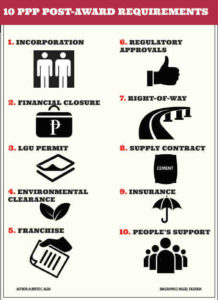‘Responsive-ility’ and responsibility Public-Private Partnership (PPP) arrangements—whether for water, reclamation, power, mass transport systems and…
‘Nightmares’ after award of PPP contracts
‘Nightmares’ after award of PPP contracts

WHAT happens after a public-private partnership (PPP) contract is signed? Can the private-sector proponent (PSP) immediately construct the facility after issuance of the notice of award? What are the CPs, or conditions precedent, before the PSP can proceed? Which is more difficult—getting the award, being allowed to proceed or implementing the project?
Contrary to what others might say, it is not smooth sailing after an implementing agency (IA) and a PSP seal a PPP contract. After going through a bidding process, which on the average takes 29 months to complete for national projects, there is no assurance that the IA and PSP will have no more headaches. History has taught us that, like in any partnership or project, there are stress points.
• Post-notice of award (NOA)-Pre-notice to proceed (NTP). The PSP cannot immediately undertake the PPP project right after the signing of agreement with the IA and issuance of the NOA. The PSP, with the help of the IA, must comply with the CPs before it obtains the go signal to proceed with the construction and implementation.
Financial closure is needed. A special project company must be incorporated by the PSP. Insurance and supply agreements must be obtained. When required, an environmental compliance certificate must be issued. The franchise and approvals must be secured from the regulatory agency. For toll-road projects and reclamation projects, the Toll Regulatory Board and Philippine Reclamation Authority, respectively, must give their thumbs up.
And let us not discount the possibility that taxpayers, affected sectors, even public officials may assail the PPP contract in court or subject the same to congressional inquiry. The modernization of the Philippine Orthopedic Center and Mactan-Cebu International Airport Passenger Terminal were the subjects of disputes.
• Post-NTP to Pre-start-up. After getting the NTP, the PSP can now start construction. This presupposes that local government permits have been secured. Right-of-way problems must be contended with. Further, delays may be brought about by supply and importation concerns. At this point, no revenues will come in, as the water, power, terminal, toll road or health facility has not been turned over by the contractor to the PSP or its implementing or management unit.
• Start-up to end of contract. Project life begins here. Experts call this the contract-management phase. Consumers can now use the toll bridge, lounge in the terminal and enjoy 24/7 water supply. The PSP, if authorized, can now collect from the end-users and/or from the government. But first, the concerned regulator must set the tariff. Variations or amendments, if permitted, may also happen during the
term of the project.
The PSP must fulfill all its contractual commitment, otherwise, it runs the risk of pretermination, arbitration, litigation and a call on its performance security.
There will be changes in leadership during the project term, which may last for 25 to 50 years. PSPs hope that their contracts will not be unilaterally rescinded, no new tax regime will be enforced, no law will be given retroactive effect, no new opinion and no new interpretation of a contractual provision will be issued that will materially and adversely affect the interests of the PSPs. These are instances of successor risk.
All these are the postaward nightmares. Future-proofing PPP arrangements is the challenge we all must face.
